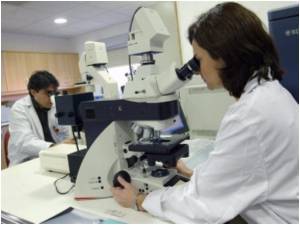A Mayo Clinic study has found that Imetelstat, a novel telomerase inhibiting drug, has been found to induce morphologic, molecular and clinical remissions in some patients with myelofibrosis.

"These are early results but they are promising, says the study's lead author, Ayalew Tefferi, M.D. a hematologist at Mayo Clinic. "Some patients in our clinical trial taking imetelstat obtained dramatic responses and there have been some complete responses which is almost unheard of for drug therapy in this disease."
Myelofibrosis is a chronic myeloid cancer in which bone marrow cells that produce blood cells develop and function abnormally. The result is the formation of scar tissue in the bone marrow (fibrosis), severe anemia that often requires transfusion, weakness, fatigue and an enlarged spleen and liver. Patients with myelofibrosis harbor one of several genetic mutations in their blood stem cells, including JAK2, MPL, CALR, ASXL1 and spliceosome pathway mutations.
"Typically, myelofibrosis is characterized by marrow scarring and although patients may derive symptomatic relief from other treatments such as ruxolitinib, they usually do not revert back to normal bone marrow," Dr. Tefferi says. "Some patients in our trial have reverted back to normal bone marrow."
Imetelstat works by inhibiting telomerase activity in tumor cells which leads to cell death.
Researchers studied imetelstat in 33 patients at Mayo Clinic and have now followed the first 22 patients for a minimum of six months. Among the 22, five patients achieved complete or partial remissions, including reversal of bone marrow fibrosis in four of the five patients. Two of the five patients with complete or partial remission have also experienced complete molecular remissions. The overall response rate was 41 percent.
Financial support for the study was provided by Geron Corporation.
As a leading institution funded by the National Cancer Institute, Mayo Clinic Cancer Center conducts basic, clinical and population science research, translating discoveries into improved methods for prevention, diagnosis, prognosis and therapy. For information on cancer clinical trials, call 507-538-7623.
Source-Newswise
 MEDINDIA
MEDINDIA




 Email
Email





